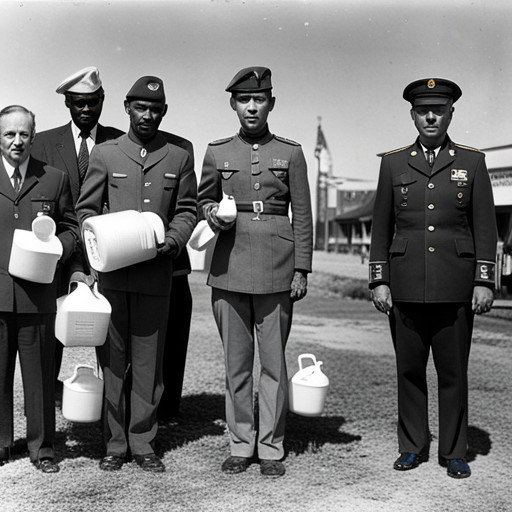Camp Lejeune Water Contamination Eligibility Risks and Legal Action
This article examines the historical backdrop of the Camp Lejeune water contamination, including the associated health risks and legal implications.

It further explores the eligibility criteria for filing claims under the Camp Lejeune Justice Act, as well as the process and challenges involved in such legal actions.
The future implications for affected individuals are also discussed, in view of the ongoing health and environmental impacts of this significant contamination event.
Key Takeaways
- Military veterans, civilian employees, local work contractors, and parents of children at Camp Lejeune children's daycare facilities may qualify to file a Camp Lejeune Justice Act claim.
- Survivors of those who died from cancer and served at Camp Lejeune can now seek legal action against the Navy, Marines, and the Federal government.
- The Camp Lejeune water problems began in 1953 when toxic waste was improperly disposed of on the base, contaminating the water supply.
- Millions of Marines and their families were exposed to carcinogens and forever chemicals through tap water consumption.
Understanding the History of Camp Lejeune Water Contamination

The history of water contamination at Camp Lejeune dates back to 1953 when improper disposal of toxic waste resulted in the pollution of the base's water supply, exposing millions of Marines and their families to carcinogens and forever chemicals through tap water consumption.
This history of contamination had severe implications, leading to investigations into long term health effects. Studies revealed an increased incidence of certain diseases among those exposed, including leukemia, bladder cancer, and birth defects.
Moreover, environmental repercussions were significant, with the contamination affecting local ecosystems. Efforts to remediate the situation have been extensive, but the legacy of the contamination continues to impact the health of individuals exposed and the surrounding environment to this day.
Potential Health Risks Associated With the Contamination

Potential health hazards associated with this environmental disaster include an increased risk of developing cancer, particularly for children born on the base, and other conditions such as Parkinson's disease. The long term consequences of exposure to this contaminated water are still being studied, but evidence points to severe, and often irreversible, health impacts.
These hazardous substances, improperly disposed of in 1953, entered the water supply and remained undetected for decades. Millions of Marines and their families were exposed to these carcinogens, causing a public health crisis.
Compensation options for those affected are currently being explored through the Camp Lejeune Justice Act. These provisions offer a legal pathway for survivors and their families to seek redress for the harm suffered.
The Legal Framework: Camp Lejeune Justice Act

Enacted to provide justice to those affected, the Justice Act serves as a pivotal legal framework for survivors seeking compensation for damages incurred from exposure to environmental hazards.
This Act has a profound impact on military families, particularly those affected by the Camp Lejeune water contamination incident. The Act outlines the legal rights and compensation options available to survivors, including military veterans, civilian employees, and parents of children exposed to the toxic substances at Camp Lejeune.
It permits legal action against responsible entities, paving the way for potentially significant settlements. Furthermore, the Act has set a precedent for legal recourse in similar environmental hazard cases, emphasizing the importance of accountability in instances of neglectful environmental management and its subsequent health impacts.
Who Is Eligible to File a Claim

Justice Act claims can be filed by a diverse group including military veterans, civilian employees, local work contractors, and parents of children who were in childcare facilities at the affected base. The eligibility criteria for the Camp Lejeune Justice Act claims extend to those who resided at the base for at least 30 days between 1953 and 1987.
The contaminated drinking water, laced with toxic chemicals, has led to several health issues including cancer and Parkinson's disease. Compensation options for survivors of Camp Lejeune water contamination are pursued through a federal tort claim. This compensation is aimed at covering medical expenses and providing restitution for the undue suffering caused by the negligent practices at Camp Lejeune.
Thus, understanding these criteria is crucial for pursuing justice.
The Process of Filing a Legal Action: Steps and Challenges

Navigating the complexities of filing a claim under the Justice Act can present a myriad of challenges, underscoring the necessity for comprehensive understanding of the process.
The steps for filing a claim may include:
1. Identifying eligibility based on exposure to contaminated water at Camp Lejeune.
2. Gathering and submitting necessary medical documentation linking health issues to the contamination.
3. Navigating legal protocols and adhering to the stipulated timeline for filing.
4. Overcoming legal challenges faced, such as proving causation and dealing with potential claim denials.
An understanding of these steps can aid in navigating the multifaceted legal process. However, the environmental and health impacts of the contamination pose significant challenges, necessitating the need for expert legal assistance to ensure accurate filing and satisfactory resolution of claims.
Future Implications: What’s Next for Affected Individuals?

Future implications of this environmental disaster present significant challenges and uncertainties for those affected. They grapple with potential health issues and seek reparation for their suffering.
Detailed research reveals long term health effects such as an increased risk of developing cancer, Parkinson's disease, and other illnesses due to exposure to contaminated water. The connection between these health issues and the water contamination at Camp Lejeune is a subject of ongoing studies.
Additionally, the pursuit of compensation for victims is littered with legal complexities. The Camp Lejeune Justice Act, while providing a pathway for compensation, is fraught with delays exacerbating the difficulties faced by the victims.
The long-term consequences of this disaster, thus, extend beyond immediate health concerns to include legal and financial uncertainties.
Frequently Asked Questions
What Specific Types of Cancer Have Been Linked to the Water Contamination at Camp Lejeune?
Research indicates a link between water contamination at Camp Lejeune and specific cancers, such as leukemia, bladder, kidney, and liver cancer. Health monitoring programs and contamination prevention measures remain crucial in addressing these health risks.
How Long Should I Expect the Claim Process to Take Under the Camp Lejeune Justice Act?
The duration of the claim process under the Camp Lejeune Justice Act varies, influenced by factors such as claim documentation completeness, review timelines, and compensation expectations. Detailed research and factual reporting are essential.
Are There Any Support Groups or Resources Available for Those Affected by the Camp Lejeune Water Contamination?
Numerous Contamination Support Networks exist, providing resources for those impacted by environmental hazards. Accessibility to these resources offers emotional aid, health information, and advocacy opportunities, crucial for coping with health and environmental impacts.
Can I Still File a Claim if I Was Not Directly Exposed to the Contaminated Water, but a Family Member Was?
Claim eligibility in cases of environmental contamination often extends to those indirectly exposed via family members. Thus, potential impacts of the contamination on such individuals can be actionable under certain circumstances.
How Will My Claim Be Impacted if the Person Affected by the Contamination Has Since Passed Away?
Posthumous claims under the Camp Lejeune Justice Act permit survivors of deceased individuals affected by the contamination to seek legal action, potentially encompassing wrongful death suits, depending on the circumstances and specific health impacts involved.

This post has been generated by AI and was not reviewed by editors. This is Not legal advice. Please consult with an attorney.




